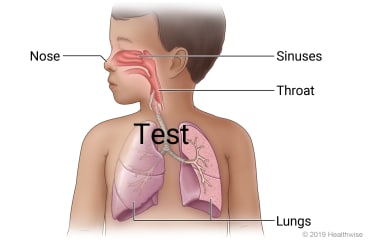
Overview
An upper respiratory infection, also called a URI, is an infection of the nose, sinuses, or throat. URIs are spread by coughs, sneezes, and direct contact. The common cold is the most frequent kind of URI. The flu and sinus infections are other kinds of URIs.
Almost all URIs are caused by viruses, so antibiotics won't cure them. But you can do things at home to help your child get better. With most URIs, your child should feel better in 4 to 10 days.
Follow-up care is a key part of your child's treatment and safety. Be sure to make and go to all appointments, and call your doctor if your child is having problems. It's also a good idea to know your child's test results and keep a list of the medicines your child takes.
How can you care for your child at home?
- Give your child acetaminophen (Tylenol) or ibuprofen (Advil, Motrin) for fever, pain, or fussiness. Be safe with medicines. Read and follow all instructions on the label. Do not give aspirin to anyone younger than 20. It has been linked to Reye syndrome, a serious illness.
- Be careful with cough and cold medicines. Don't give them to children younger than 6, because they don't work for children that age and can even be harmful. For children 6 and older, always follow all the instructions carefully. Make sure you know how much medicine to give and how long to use it. And use the dosing device if one is included.
- Be careful when giving your child over-the-counter cold or flu medicines and Tylenol at the same time. Many of these medicines have acetaminophen, which is Tylenol. Read the labels to make sure that you are not giving your child more than the recommended dose. Too much acetaminophen (Tylenol) can be harmful.
- Make sure your child rests. Keep your child at home if they have a fever.
- If your child has problems breathing because of a stuffy nose, squirt a few saline (saltwater) nasal drops in one nostril. Then have your child blow their nose. Repeat for the other nostril. Do not do this more than 5 or 6 times a day.
- Place a cool-mist humidifier by your child's bed or close to your child. This may make it easier for your child to breathe. Follow the directions for cleaning the machine.
- Give your child lots of fluids. This is very important if your child is vomiting or has diarrhea. Give your child sips of water or drinks such as Pedialyte or Infalyte. These drinks contain a mix of salt, sugar, and minerals. You can buy them at drugstores or grocery stores. Give these drinks as long as your child is throwing up or has diarrhea. Do not use them as the only source of liquids or food for more than 12 to 24 hours.
- Keep your child away from smoke. Do not smoke or let anyone else smoke around your child or in your house.
- Wash your hands and your child's hands regularly so that you don't spread the disease.
When should you call for help?
Call 911 anytime you think your child may need emergency care. For example, call if:
- Your child seems very sick or is hard to wake up.
- Your child has severe trouble breathing. Symptoms may include:
- Using the belly muscles to breathe.
- The chest sinking in or the nostrils flaring when your child struggles to breathe.
Call your doctor now or seek immediate medical care if:
- Your child has new or worse trouble breathing.
- Your child has a new or higher fever.
- Your child seems to be getting much sicker.
- Your child coughs up dark brown or bloody mucus (sputum).
Watch closely for changes in your child's health, and be sure to contact your doctor if:
- Your child has new symptoms, such as a rash, earache, or sore throat.
- Your child does not get better as expected.
Where can you learn more?
Go to http://www.healthwise.net/patientEd
Enter M207 in the search box to learn more about "Upper Respiratory Infection (Cold) in Children: Care Instructions".
Current as of: September 30, 2025
Author: Ignite Healthwise, LLC Staff
Clinical Review Board
All Ignite Healthwise, LLC education is reviewed by a team that includes physicians, nurses, advanced practitioners, registered dieticians, and other healthcare professionals.

